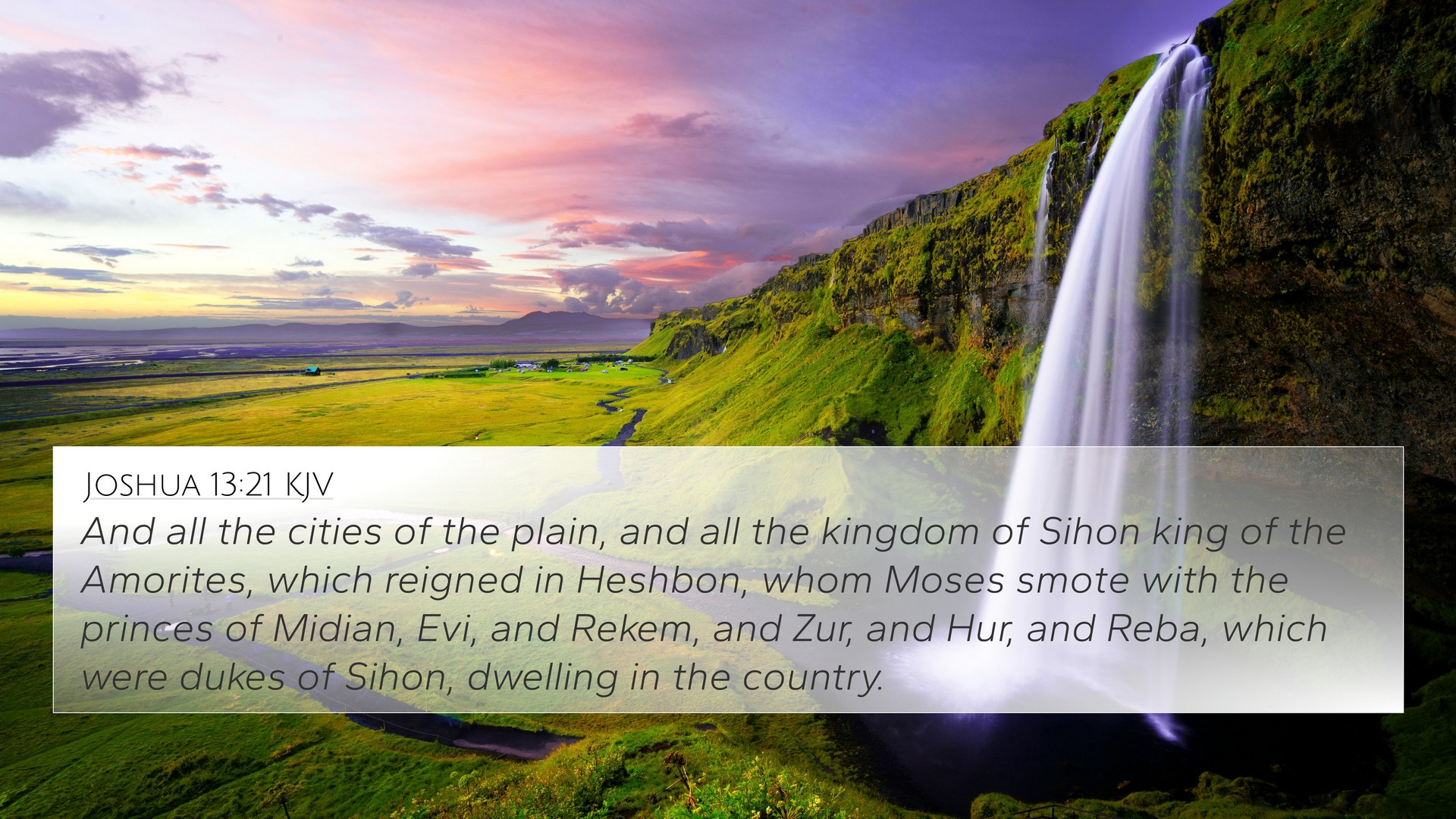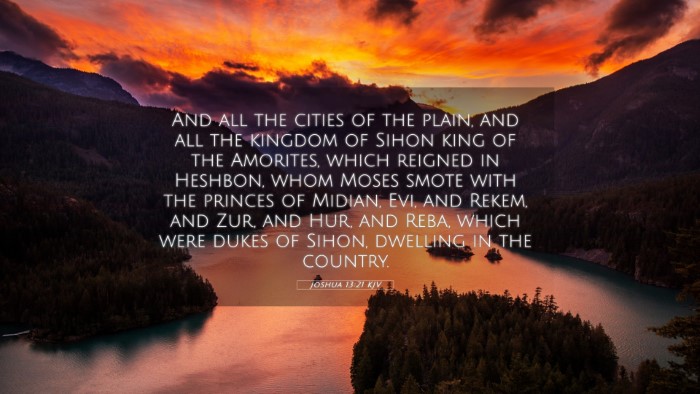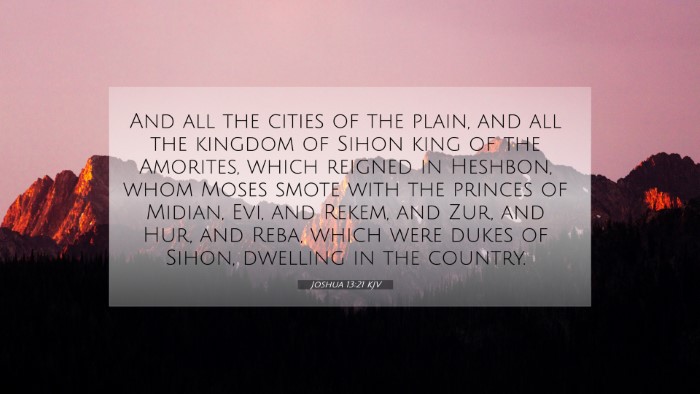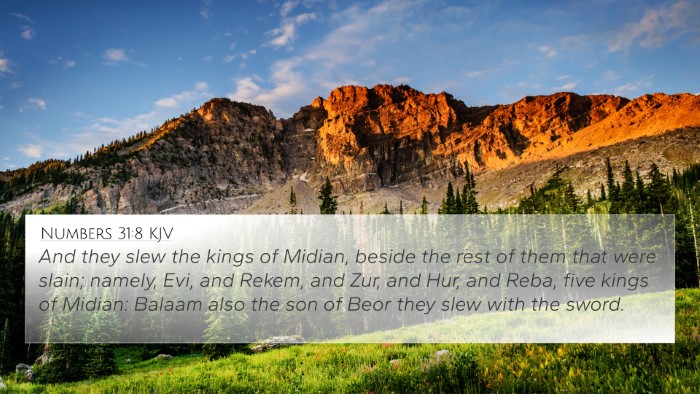Understanding Joshua 13:21
Joshua 13:21 states: "And all the cities of the plain, and all the kingdom of Sihon, which was the king of the Amorites, and the land of the Geshurites and Maachathites, and all the kingdom of Og, which was in Bashan." This verse summarizes the regions that were conquered by the Israelites and provides insights into the broader narrative of God's promises and the fulfillment of these promises through military conquests.
Contextual Overview
In the book of Joshua, we find a chronological account of the Israelites’ conquest of Canaan, under the leadership of Joshua. With this verse, the focus is on the territories that were not allocated to the tribes of Israel but were significant in establishing God's sovereignty over the nations that opposed His people.
Commentary Insights
- Matthew Henry:
Henry emphasizes that the defeat of Sihon and Og represents a demonstration of God’s power in fulfilling His covenant with Israel. The mention of these kingdoms shows that although the land was extensive and daunting, God was with them in every battle.
- Albert Barnes:
Barnes points out the significance of the names mentioned, tying them to the historical and theological themes of the Israelites' journey. He notes that these regions symbolize God’s judgment upon nations that turned against His people and the assured inheritance for Israel.
- Adam Clarke:
Clarke provides a detailed geographical analysis, highlighting the importance of the land's contextual identity. He connects it to the broader themes of God's justice in bringing judgment upon the wicked and His goodness in bestowing land to His chosen people.
Thematic Connections and Cross-References
This verse can be better understood within the framework of several biblical themes and cross-references:
- Psalms 135:10-12: Discusses God’s strength in defeating nations, paralleling the conquests mentioned in Joshua 13:21.
- Deuteronomy 3:1-11: This passage recounts the defeat of Sihon and Og, giving a historical background that complements Joshua’s account.
- Numbers 21:21-35: Offers a narrative of Israel's conquests over the Amorite kingdoms, providing continuity and historical context.
- Numbers 32:33: Discusses the allocation of land to the tribes of Reuben and Gad, connecting Israel's military conquests to land inheritances.
- Joshua 12:4-5: Lists the kings defeated by Moses, setting the stage for Joshua's later victories, effectively linking these Biblical accounts.
- Joshua 3:10: Highlights God’s sovereignty and power in delivering the Amorites into Israel’s hands, resonating with the themes of Joshua 13:21.
- Isaiah 17:1: Prophecies regarding the downfall of certain kingdoms, reflecting the ongoing theme of God’s control over nations.
- Romans 15:4: Stresses the importance of Old Testament narratives for instruction and encouragement in faith, making the historical accounts relevant for New Testament readers.
- 2 Timothy 3:16-17: Points to the inspiration of scripture, confirming the significance of historical accounts as they contribute to doctrine and moral correction.
- Hebrews 11:32-34: References the faith of Israel’s leaders in battles, indirectly connecting back to the themes of conquest in Joshua 13.
Inter-Biblical Dialogue
This verse not only serves as a historical record but also engages in an inter-biblical conversation that explores God's intentions for Israel, the nature of divine justice, and the establishment of His kingdom on earth. Each cross-reference enhances the comprehension of the original text by providing parallels and contrasts that deepen understanding.
Practical Applications for Study
When studying scripture, utilizing tools for Bible cross-referencing can enhance one’s understanding of Biblical narratives. Here are a few approaches to help in this practice:
- Use a Bible concordance to identify key terms and their occurrences throughout scripture.
- Engage with a Bible cross-reference guide to build connections between similar themes or teachings.
- Participate in cross-referencing Bible studies to explore the interconnections of scripture more deeply.
- Examine the Bible chain references that some publications provide to follow thematic links throughout the text.
- Utilize a comprehensive Bible cross-reference materials to aid in sermon preparation or personal study.
Conclusion
Joshua 13:21 serves as a potent reminder of God’s promises and the histories intertwined within them. As believers seek understanding of scripture, connecting verses like this one offers profound insights into God’s overarching plan for His people. The rich tapestry of connections within the Bible invites readers to explore deeply the thematic elements and historical contexts that enrich their faith.






